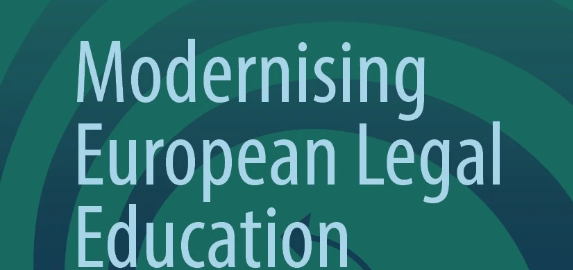The e-book “Modernising European Legal Education (MELE): Innovative Strategies to Address Urgent Cross-Cutting Challenges”, co-edited by Thomas Giegerich, has just been published by Springer. It is open-access and freely available here. This book is the result of a three-year Strategic Partnership for Higher Education funded by the European Union’s Erasmus+programme which brought together eight European universities, the South Eastern European Law School Network (SEELS), and The European Network for Clinical Legal Education (ENCLE) as associate partner, under the lead of the Europa-Institut of Saarland University.
Apart from the introduction, the new volume contains seventeen papers grouped in the five parts “Law and Education Innovation”, “Law and Gender”, “Law and the Climate Crisis”, “Law and Datafication” and “Law and COVID-19”. Thomas Giegerich has contributed a paper in Part 2 on “Gendering Political Participation in Germany: Should Quotas Ensure Gender Parity in Parliaments?”. This is an updated and extended version of his 2021 Saar Expert Paper “Gender equality and gender quotas for political participation in Europe: comparative, international and supranational perspectives.” It now also includes a discussion of the bill for a “Half the Power Law” newly introduced in the Bavarian State Parliament in 2023 as well as the legislative resolution on the proposal for a Council Regulation on the election of the members of the European Parliament by direct universal suffrage adopted in May 2022 by the European Parliament. Art. 10 (1) of the proposed Regulation would oblige political parties and other entities, when nominating candidates, to “observe democratic procedures, transparency and gender equality”. Specifically, “[g]ender equality shall be reached depending on the Member States electoral systems and in any event in the Union-wide constituency by the use of zipped lists or quotas, without infringing the rights of non-binary people.”
Thomas Giegerich argues that “[t]here is an obvious connection between the political empowerment gap and the gender gap. The persistent gender gap in most areas can be used as prima facie evidence that male-dominated parliaments do not care enough about ensuring the de facto equality of women, because male parliamentarians are socialised as males so that their decision-making is shaped by male experiences, perspectives and interests. The prima facie evidence is strong enough for a shift of the burden of proof in the sense that those who deny the necessity of gender parity in political representation for achieving women’s de facto equality bear the burden of proof.” [footnote omitted]
Thomas Giegerich concludes that “[o]ne way to raise awareness of the gender gap in general and the gender gap in political empowerment in particular is to promote gender-sensitive legal education. Law students will be trained to recognise de jure and de facto discrimination of women and learn to include social and political reality in their legal assessments. They will be informed about existing hard law and soft law rules as well as mechanisms of redress in favour of women. They will be made aware of the possible need for further rules and mechanisms in order to eliminate discrimination and gender-based disadvantages for good and promote de jure and de facto equality between women and men across the board. They will also learn how to lead the legal and political battles for a gender-equitable society in parliaments, the courts and the general public. Most importantly, however, gender-sensitive young lawyers will function as multipliers of gender equality and gender sensitivity in society at large.”
The Abstract of the new book chapter reads as follows: “The underrepresentation of women in parliaments indicates the political empowerment gap underlying the gender gap and is a symbol of their de facto inequality. Electoral laws that ensure gender parity are therefore on the agenda. This is also the case in Germany (both on the state and federal level) and in the EU in relation to the European Parliament. Gender parity laws typically require political parties to submit zipped lists with an equal number of alternating female and male candidates. The first two gender parity laws of German states were, however, struck down as unconstitutional by the state constitutional courts. According to the Federal Constitutional Court, the Basic Law does not require the enactment of gender parity laws, despite the constitutional obligation to promote the actual implementation of equal rights for women and men. But the FCC has not yet determined what limits the Basic Law may place on voluntarily enacted federal or state gender parity laws. The European Court of Human Rights has accepted gender quotas regarding electoral lists as permissible in the ECHR system. Soft law rules of the Council of Europe favour the use of such quotas. The Convention on the Elimination of All Forms of Discrimination of Women supports and perhaps requires gender quotas in political representation.”


